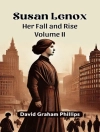Dive into the shadowy realms of ’60 GOTHIC CLASSICS, ’ an anthology that masterfully weaves the dark tapestry of Gothic literature, capturing the genre’s brooding atmospheres, suspenseful plots, and hauntingly beautiful prose. This collection encompasses a broad spectrum of literary styles, from chilling narratives and psychological horror to romanticized gloom, encapsulating the Gothic’s intricate dance between fear and beauty. While each piece stands as a testament to the powerful allure of the Gothic tradition, certain stories beckon with a uniquely captivating power—stories that linger in the corridors of the mind, their echoes resonating long after the final page is turned. The anthology showcases the brilliant minds that defined and redefined the Gothic genre, including the likes of iconic authors such as Mary Shelley, Edgar Allan Poe, and Charlotte Perkins Gilman. These literary giants, along with an impressive array of other seminal writers, offer unparalleled insights into the evolving societal, cultural, and psychological themes that have shaped Gothic literature through the ages. Collected works from Victorian England, Romantic France, and beyond unite the diverse voices and nightmares of different eras, broadening the reader’s understanding of the enduring gothic fascination with the supernatural, the unknown, and the uncanny. Embark on an extraordinary journey through this meticulously curated volume, which offers a rare opportunity to explore Gothic’s multifaceted nature through the eyes of its most celebrated architects. With an unparalleled breadth and depth of insights, ’60 GOTHIC CLASSICS’ is an indispensable resource for aficionados and scholars alike, inviting fresh discourse and contemplation. Readers are encouraged to immerse themselves in the chilling beauty and intellectual rigor of this collection—a literary compendium that serves as both a haunting exploration of human fears and an educational treasure trove for any who dare to uncover its secrets.
Om författaren
Charles Dickens (1812–1870) is often regarded as the greatest novelist of the Victorian era. His enduring literary contributions reflect a keen observation of character and society, combining realism with a rich vein of humor and pathos. An advocate for the poor and marginalized, Dickens’s own experiences of hardship and a stint in a blacking factory as a child permeated his work. ’60 Gothic Classics’ would not be a traditional compilation by the author; rather, it’s a collection that may include his gothic-influenced narratives. Dickens was a masterful storyteller whose novels often wove intricate plots with a nuanced examination of social inequalities and reform. His characters, from the iconic Ebenezer Scrooge in ’A Christmas Carol’ to the orphaned Oliver Twist, have become fixtures in literary culture. Dickens’s works also demonstrate a fondness for the macabre and the sensational, which can be seen in stories such as ’The Signal-Man’ and the unfinished ’The Mystery of Edwin Drood’. These elements of his writing may contribute to his inclusion in gothic literary anthologies. His novels were originally published in serial form, engaging a broad readership with cliffhangers and intricate narratives. Dickens’s legacy as an author includes a lasting impact on the English language and literature, with his works continuing to be read and studied for their artistic merit and social commentary.












